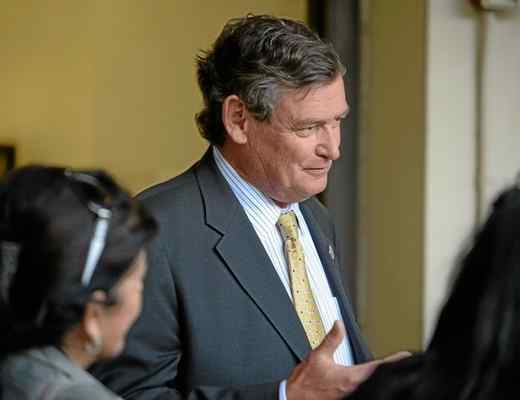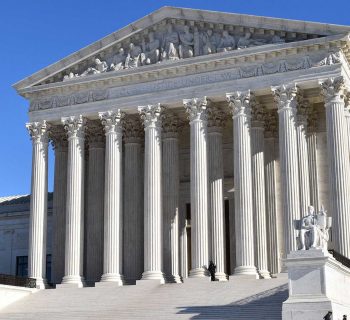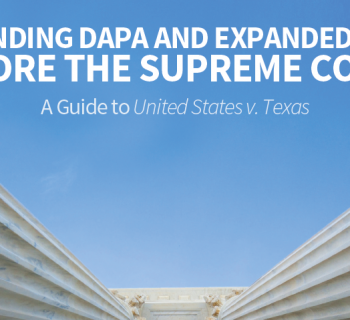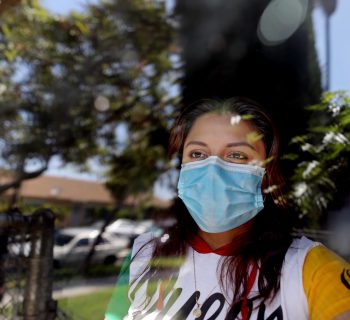Undocumented students attending Cal State University campuses have been advised to call their own schools’ police services for help if they are approached by other law enforcement officers investigating students’ immigration statuses.
“We do not have any information that stepped-up enforcement will focus on our campuses,” Chancellor Timothy P. White wrote in a memo to the presidents of all 23 CSU campuses Wednesday.
“We do advise any member of our CSU community — students, faculty and staff — who is approached while on campus by federal, state or local officials asking for information or documentation regarding immigration status, to immediately contact the University Police Department.”
The campus police departments will act as liaisons with on-site officials, White said, and will coordinate to provide students with guidance and resources.
UNDOCUMENTED STUDENTS
Campus Reform, a project of the conservative Leadership Institute, reported Thursday morning on White’s memo, and the CSU Chancellor’s office in Long Beach confirmed its existence hours later.
At Cal State Dominguez Hills in Carson, students received a message from campus President Willie J. Hagan providing them with a copy of the memo and the 24-hour telephone number to contact campus police.
White dispatched the memo two days after the U.S. Homeland Security Department published a pair of memoranda from Secretary John Kelly outlining more stringent immigration enforcement policies in accordance with President Donald Trump’s orders.
In his message, White also advised campus presidents that CSU staffers are examining emerging federal policies in order to ascertain how they may affect CSU schools. Homeland Security’s new directives do not alter policies created during the Obama years that protect undocumented students from deportation proceedings.
The prior administration created the Deferred Action for Childhood Arrivals program, or DACA, in 2012 to shield certain young people who came into the United States illegally before reaching the age of 16.
Undocumented immigrants applying for protection under DACA had to meet certain conditions, such as not having committed felonies or serious misdemeanors since entering the United States.
“The CSU serves approximately 8,000 undocumented students, some of whom benefit from DACA, and we have taken this opportunity to communicate to that population how the recent guidelines issued by the Department of Homeland Security would affect them — which is to say that they are unaffected for the time being,” CSU spokesman Michael Uhlenkamp said in an email.
Although CSU students now have the option to ask campus police officers for help if they’re worried about an interaction with officials enforcing immigration policy, CSU leaders doubt this scenario will play out in real life.
“We do not anticipate these types of interactions on the campuses,” Uhlenkamp said.
A 2011 policy generally blocks U.S. Immigration and Customs Enforcement officers from conducting immigration enforcement activities at sensitive locations such as schools, including universities and places of worship.
Agency spokeswoman Virginia Kice said that policy remains in effect following the secretary’s new memoranda.
IMMIGRATION ENFORCEMENT
Homeland Security’s new immigration policies have aroused fears among immigration activists that the federal government is on the verge of mass deportations.
Kelly’s memos declared his plans to hire 10,000 new ICE agents and officers and 5,000 new Border Patrol officers. Although the new policies do not rescind DACA, other classes of undocumented immigrants will, outside of limited exceptions, be subject to proceedings that may lead to their deportations.
“Based on those memos, everybody (who is undocumented) is a target; there’s no longer prosecutorial discretion,” Angelica Salas, executive director of the Coalition for Humane Immigrant Rights of Los Angeles, said this week.
Appearing Thursday in Mexico City, Kelly said Homeland Security is not planning mass deportations, nor any coordination with the military to enforce immigration law.
President Trump, however, had said earlier in the day that immigration enforcement would be a “military operation.”
“Because what has been allowed to come into our country, when you see gang violence that you’ve read about like never before and all of the things, much of that is people who are here illegally. And they’re rough and they’re tough, but they’re not tough like our people. So we’re getting them out,” Trump said.
The Associated Press contributed to this report.







